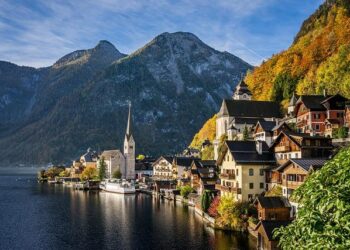France has joined a growing list of European countries-including Mexico, Spain, Portugal, Italy, Belgium, and Austria-grappling with a surge of overtourism protests that are sweeping across borders. As local communities and activists voice mounting frustration over the environmental and social impacts of mass tourism, authorities are facing increasing pressure to implement sustainable measures. This latest wave of demonstrations underscores a broader challenge confronting popular travel destinations worldwide, signaling a critical moment for the tourism industry. Stay tuned for the latest travel updates and what these developments mean for travelers and destinations alike.
France Faces Rising Overtourism Protests Following Trends in Southern Europe
Across Southern Europe, communities are pushing back against the relentless surge in tourism, and France is now firmly in the spotlight. From the sun-drenched coasts of Barcelona to the historic streets of Rome, local residents have voiced growing frustration over overcrowded landmarks, inflated prices, and the diminishing quality of everyday life. French cities like Nice, Marseille, and Bordeaux are witnessing a wave of demonstrations calling for stricter visitor caps and sustainable tourism policies. Activists argue that without immediate intervention, the cultural and environmental fabric of these iconic destinations will continue to unravel under the strain of unregulated travel.
Key Demands from Overtourism Protests Across Europe:
- Implementation of daily visitor limits at major sites
- Higher tourist taxes to fund local infrastructure
- Promotion of off-season and rural destinations
- Enhanced regulation of short-term rental platforms
| Country | Major Cities Affected | Main Protest Issues |
|---|---|---|
| France | Nice, Marseille, Bordeaux | Overcrowding, Housing Prices |
| Spain | Barcelona, Madrid | Environmental Damage, Noise |
| Italy | Venice, Rome | Heritage Preservation, Overcrowding |
| Portugal | Lisbon, Porto | Rental Controls, Tourist Caps |
Impact on Local Communities and Tourist Services Amid Growing Demonstrations
As demonstrations against overtourism surge across Europe and beyond, local communities are facing a complex web of challenges. Residents in heavily trafficked destinations report disruptions to daily life, including increased noise levels, congestion, and pressure on public services. Small businesses are caught in the crossfire-some lament the loss of regular customers amid protest-related closures and restrictions, while others voice support for measures that aim to protect community well-being and preserve cultural heritage. The visible presence of protestors, coupled with amplified security measures, has also altered the visitor experience, leading some travelers to reconsider or postpone their trips entirely.
Tourist service providers are rapidly adapting to the changing landscape. Hotels, transport operators, and tour guides now frequently update advisories to keep visitors informed about potential disruptions. Industry experts emphasize the urgent need for sustainable tourism models to balance economic benefits with social responsibility. Key impacts observed include:
- Reduced tourist inflow in affected neighborhoods during peak protest periods
- Increased operational costs due to enhanced security and mitigation strategies
- Heightened community engagement initiatives involving both locals and businesses
- Development of alternative tourist routes to circumvent protest hotspots
| City | Estimated Tourist Revenue Loss | Number of Protests This Month |
|---|---|---|
| Paris | ‚ā¨3.2M | 7 |
| Barcelona | ‚ā¨1.5M | 5 |
| Lisbon | ‚ā¨900K | 3 |
| Rome | ‚ā¨2.4M | 6 |
Travelers Urged to Stay Informed and Respect Local Guidelines to Navigate New Restrictions
As new restrictions take effect across popular European destinations, travelers are strongly advised to stay abreast of the latest local regulations to avoid disruptions. In response to escalating overtourism protests, authorities in France, along with Mexico, Spain, Portugal, Italy, Belgium, and Austria, have implemented measures including controlled access to historic sites, adjusted opening hours, and reinforced public order protocols. Visitors should routinely check official tourism websites and local news outlets for updates before planning excursions or arranging transportation.
Adhering to these guidelines not only ensures a smoother travel experience but also demonstrates respect for the communities affected by overcrowding. Essential traveler practices include:
- Booking tickets in advance where timed entry is enforced.
- Using public transport options preferred by local authorities to alleviate congestion.
- Following signage and staff instructions at protest-affected areas to maintain safety.
- Remaining flexible with itinerary plans to accommodate sudden policy changes.
| Country | Key Restriction | Traveler Tip |
|---|---|---|
| France | Restricted access to Louvre | Book timed entry online |
| Spain | Curfews in tourist hotspots | Confirm local timings daily |
| Italy | Limits on group sizes | Travel in small, approved groups |
The Way Forward
As France joins Mexico, Spain, Portugal, Italy, Belgium, and Austria in witnessing escalating overtourism protests, the global travel industry faces mounting pressure to address the growing concerns of local communities. These developments signal a pivotal moment for policymakers, tourism stakeholders, and travelers alike to re-evaluate sustainable practices and consider the broader impact of mass tourism. Staying informed on these evolving dynamics is essential for anyone engaged in international travel or tourism planning. Travel And Tour World will continue to monitor and report on this important issue as it unfolds across borders.
















